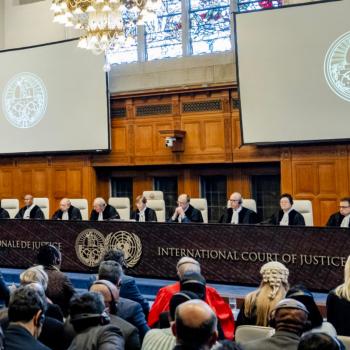Lectionary Reflections
Romans 10:5-15
August 10, 2014
In Romans, Paul's big thesis is that God has chosen to include both Jews and Gentiles in salvation (1:16-17). Gentiles have no grounds for arrogance for feeling that Israel (understood by Paul variously as the chosen people, with the occasional implication that he also means Jewish believers in Jesus) has been excluded from God's plans.
For Paul, salvation is a merciful God's intention to bring healing to a broken world. It is a gift of a God whose goal is to free us from our own self-destructive bondage to the powers of sin and death.
He understands this salvation as a gift, as the righteousness of faith. And, Paul insists, it is available to both Gentiles and Jews. God and God's salvation are closer to both groups than hands and feet.
"The righteousness of faith says 'Do not say in your heart, Who will ascend into heaven? (that is, to bring Christ down) or Who will descend into the abyss? (that is, to bring Christ up from the dead).' But… the word is near you, on your lips and in your heart" (Rom. 10: 6-8).
The proximity of God and God's salvation is good news or bad news depending on your point of view. If you are engaged in practices you don't want God to know about, it is bad news. If you want salvation for yourself, but not for those whom you disdain, God's availability to all is bad news. In either case, God's salvation is too close for your comfort.
Bad News
It's bad news for Adam who does his best to hide from God in the garden but is found out. It becomes better news when God makes provisions for him and Eve and sends them out, but not alone.
It's hard to say whether the author of Psalm 139 thinks it's good news or bad news. He recounts the futility of trying to escape the God who "searches us and knows us" and ends by asking God to lead him in the way everlasting.
God's salvation for all feels like bad news to Jonah who wants his enemies excluded from the divine embrace. He does his best to escape God's call but is reeled back in to go and complete his initial mission.
God's close proximity is all that saves Elijah as he runs from earthly danger only to encounter God in the form of angelic sustenance under the juniper tree and then a divine commission in the "sound of sheer silence" in 1 Kings 19.
God's plan for salvation for all, even those who are at the bottom rungs of society and who are religious outcasts, seems like bad news to many of the religious leaders of Jesus' day.
Good News
God's announcement of salvation through an angelic messenger seems like strange news to Mary. But she becomes an inspiration for faith, as she experiences shock and incredulity that morph, with admirable speed, into obedience.
It seems like good news to the poor, disabled, and shunned whom Jesus heals, feeds, and invites into community with himself and God.
Bad News Becomes Good News
In the big picture, the close proximity of God to all of these people turned out to be good news for them and for us. But as long as we continue to pursue our own agendas and to exclude others from God's embrace, Romans 10:6-8 will remain bad news to us.
Initially, Paul was incensed at the message of the new faith. He not only thought it was bad news, he thought it must be annihilated. The depth of his conviction that it was bad news accounts for the drama of his conversion to the good news. Not everyone has to be knocked to the ground and blinded for days.
But for everyone, there needs to be a breakthrough of some kind, a moment when we call out to the Lord and access "the righteousness that comes from faith" (Rom.10:6). It may be a moment of loss or weakness when we realize we don't have the resources to handle life alone. It may be a moment of softening of our hearts toward someone or some group we have kept at arm's length or thought of with hostility.
John Wesley's experience, for example, was much less dramatic than Paul's, but no less life changing. His was an interior experience of the love of Christ forgiving his past failures in a Chapel on Aldersgate Street in London in 1738. For most of us there is more than one moment of recognition; it is rather a journey of progressive moments.
We discover that, when we call out to the Lord, God doesn't have to go very far at all to reach us. God is not like the friend who lives four hours away and both of you agree that you wish you lived closer so you could visit more. (Then you see on Facebook that they have been within twenty minutes of you several times over the past few months.) God is in the neighborhood and comes when we call. With challenge and difficult tasks—not with candy coating and cheap grace—God comes. With the opportunity for a forgiven, reconciled relationship with God, with others, with ourselves, in a word, with salvation.





